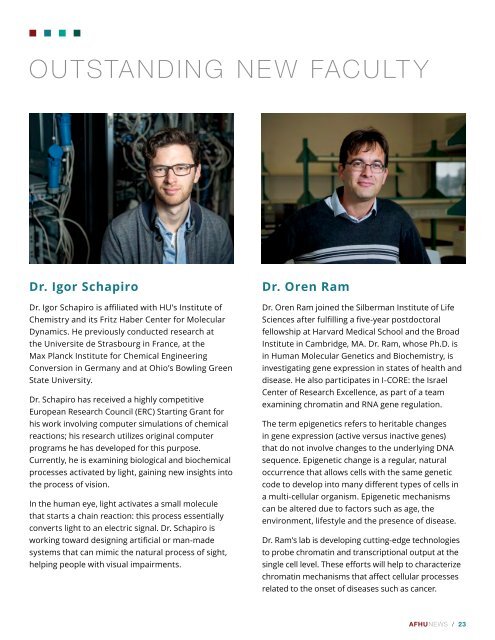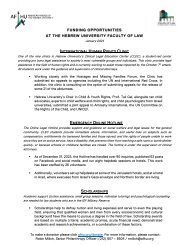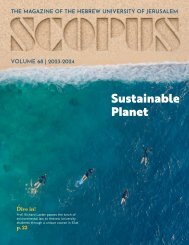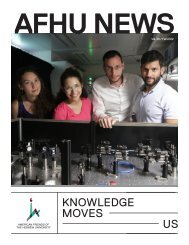You also want an ePaper? Increase the reach of your titles
YUMPU automatically turns print PDFs into web optimized ePapers that Google loves.
n n n n<br />
OUTSTANDING NEW FACULTY<br />
Dr. Igor Schapiro<br />
Dr. Igor Schapiro is affiliated with HU’s Institute of<br />
Chemistry and its Fritz Haber Center for Molecular<br />
Dynamics. He previously conducted research at<br />
the Universite de Strasbourg in France, at the<br />
Max Planck Institute for Chemical Engineering<br />
Conversion in Germany and at Ohio’s Bowling Green<br />
State University.<br />
Dr. Schapiro has received a highly competitive<br />
European Research Council (ERC) Starting Grant for<br />
his work involving computer simulations of chemical<br />
reactions; his research utilizes original computer<br />
programs he has developed for this purpose.<br />
Currently, he is examining biological and biochemical<br />
processes activated by light, gaining new insights into<br />
the process of vision.<br />
In the human eye, light activates a small molecule<br />
that starts a chain reaction: this process essentially<br />
converts light to an electric signal. Dr. Schapiro is<br />
working toward designing artificial or man-made<br />
systems that can mimic the natural process of sight,<br />
helping people with visual impairments.<br />
Dr. Oren Ram<br />
Dr. Oren Ram joined the Silberman Institute of Life<br />
Sciences after fulfilling a five-year postdoctoral<br />
fellowship at Harvard Medical School and the Broad<br />
Institute in Cambridge, MA. Dr. Ram, whose Ph.D. is<br />
in Human Molecular Genetics and Biochemistry, is<br />
investigating gene expression in states of health and<br />
disease. He also participates in I-CORE: the Israel<br />
Center of Research Excellence, as part of a team<br />
examining chromatin and RNA gene regulation.<br />
The term epigenetics refers to heritable changes<br />
in gene expression (active versus inactive genes)<br />
that do not involve changes to the underlying DNA<br />
sequence. Epigenetic change is a regular, natural<br />
occurrence that allows cells with the same genetic<br />
code to develop into many different types of cells in<br />
a multi-cellular organism. Epigenetic mechanisms<br />
can be altered due to factors such as age, the<br />
environment, lifestyle and the presence of disease.<br />
Dr. Ram’s lab is developing cutting-edge technologies<br />
to probe chromatin and transcriptional output at the<br />
single cell level. These efforts will help to characterize<br />
chromatin mechanisms that affect cellular processes<br />
related to the onset of diseases such as cancer.<br />
AFHU NEWS / 23

















